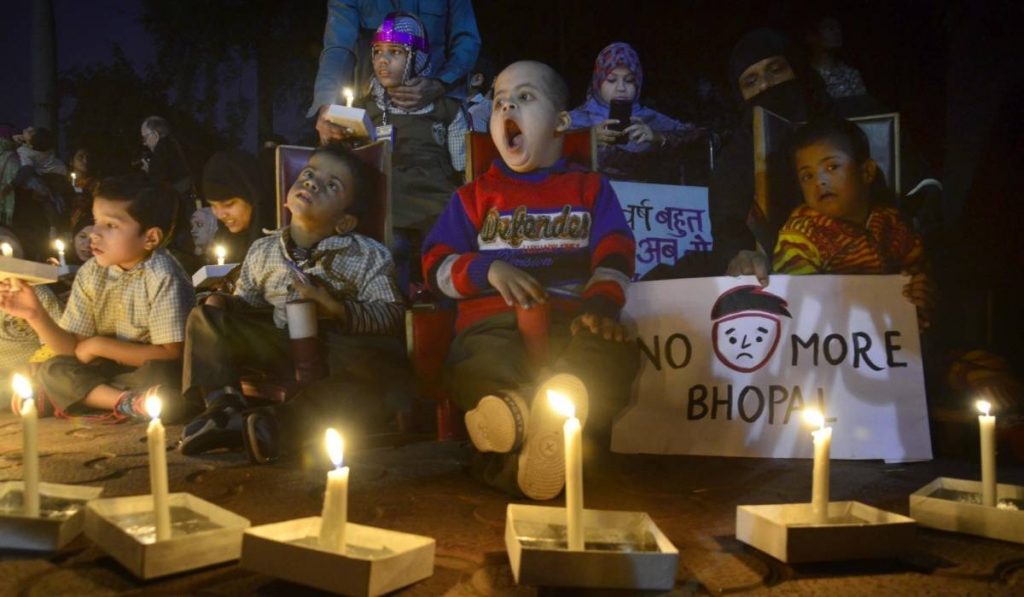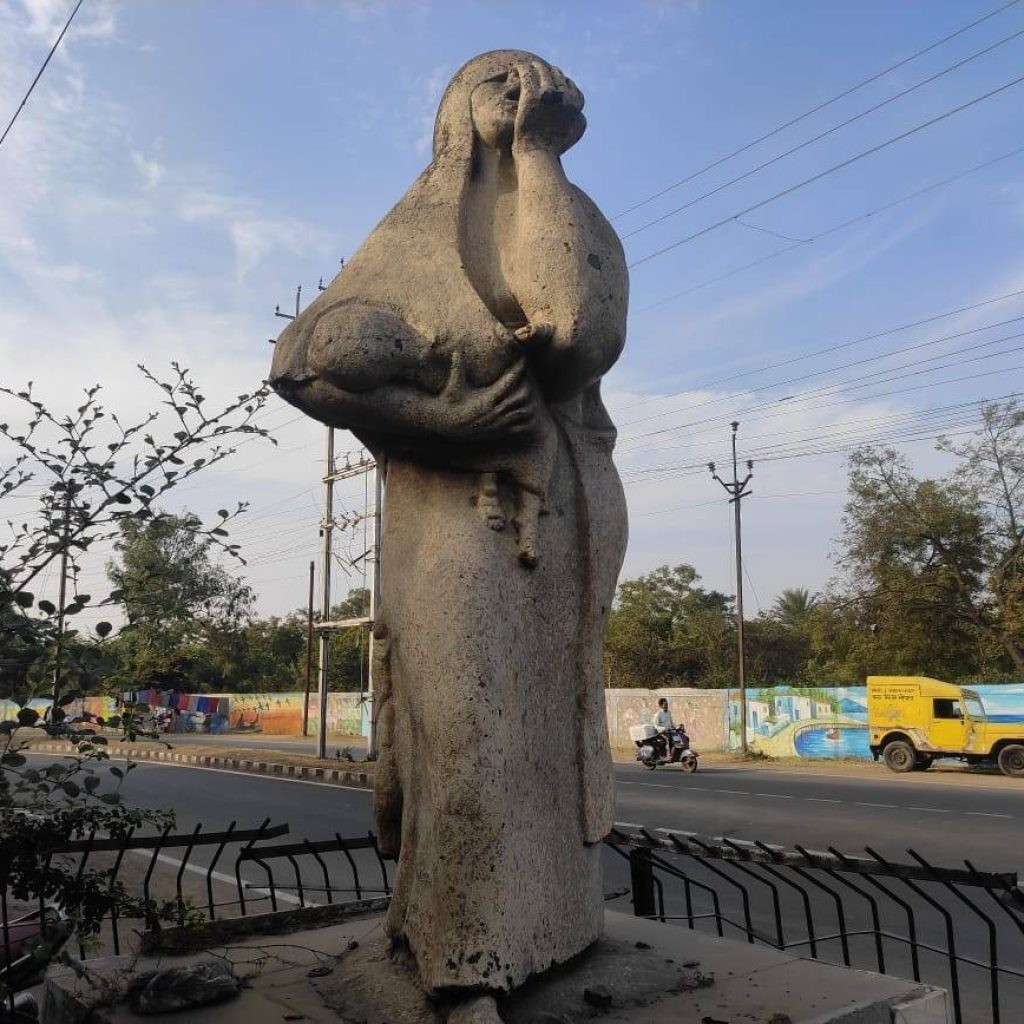The questions on a range of issues were an attempt to highlight the inaction of the state and the Centre, seeking justice, compensation and rehabilitation for the victims and their families…reports Asian Lite News.
Spread over 85 acres, the Union Carbide factory premises gives an eerie feeling with falling buildings and ever-growing shrubs, a remnant of an unparalleled tragedy that saw thousands die and lakhs suffer. Thirty-seven years after the Bhopal gas tragedy, December 3 is one of those blot marks of history that can never see closure.
Around half a dozen buildings, which include offices, guestrooms, canteen for employees and workers, etc, situated at different locations of the land are in a dilapidated state. Each one of these buildings had a specific role to play in the process of making and storing of the highly toxic substances — methyl isocyanate (MIC).
Surrounded by dense bushes, and a warning note as a prohibited zone for general public, the only building appearing to be in a better condition — is the three-storey structure, which used to be the office and the residence of senior employees of the Union Carbide Corporation (UCC), an American chemical corporation owned by Dow Chemical company. In other buildings, time and thieves have imprinted their mark.

Apart from the buildings, some other residues such as big size tanks, iron pipes along with flare towers and some other materials are also available. A heavily concrete portion of land within its boundary, located hardly 300-350 meters away from the MIC production site, appeared to be a helipad.
One of the three iron tanks (Tank – E610), whose malfunctioning had resulted in the leakage of toxic MIC gas and caused deaths of around 3,000 people within the next few hours after the leak, is seen lying along the roadside within the premises. The reports suggest that the Bhopal UCIL facility had housed three underground — 68,000 liters liquid MIC storage tanks, named — E610, E611 and E612.
As per the government’s data, over five lakh people were exposed to methyl isocyanate (MIC) gas, however, estimates vary on the death toll. A total of 2,259 deaths were immediate, the activists, however, said that around 8,000 people died within two weeks, and another 8,000 or more died from gas-related diseases over the following years.
Underground tank – E610, which had stored around 42 tonnes of MIC gas at the time of disaster — the intervening night between December 2 and 3 — was removed from its foundation and set aside later in 2010.
To protect the factory assets from thieves and to prohibit the general public’s entry within its premises, the Madhya Pradesh government in 2010 set up a concrete boundary wall. The state government has also deployed Bhopal district police for security concerns. However, only three police personnel, who are permanently deployed for security, could be seen playing cards inside.
The building, in which the police personnel are residing, is also in a poor state, with broken iron rods and damaged parts. “A total of 15 police personnel are deployed for security of the premises. Thieves would enter from the backside and break the iron rods to make a quick buck. No one is allowed to enter here without permission from the state government,” one of the police personnel said while enjoying cards with two other colleagues.
No justice in sight
A month-long protest by a group of non-governmental organisations (NGOs) with the slogan — ’37 years of Bhopal Gas Disaster: 37 questions’ — came to an end on Wednesday, which recounted the failures of the Centre in providing justice to the victims, the people of Bhopal.
Considered among the world’s worst industrial disasters, the Bhopal gas tragedy was a gas leak incident on the night of December 2-3, 1984, at the Union Carbide India Limited (UCIL) pesticide plant in Bhopal. More than five lakh people were affected by the incident, which killed several thousands of people due their exposure to methyl isocyanate (MIC) gas.
During the protest from October 26 to December 1 on the roadside, hardly 1 km from the shut factory of Union Carbide in Bhopal, the protesters, majority of them elderly women, raised one question every day for 37 days.
The questions on a range of issues were an attempt to highlight the inaction of the state and the Centre, seeking justice, compensation and rehabilitation for the victims and their families.
During a press conference on Wednesday, the protesters alleged that the Madhya Pradesh and Central governments have failed to bring all the culprits to book even after 37 years of the tragedy.
“Justice for the victims of Bhopal gas disaster is awaited even after 37 years, and many survivors are yet to receive adequate compensation. But none of the main culprits have been sent to jail, not even for a minute,” said Rashida Bee, who heads the Bhopal Gas Peedit Mahila Stationery Karmchari Sangh.
Rachna Dhingra from the Bhopal Group for Information and Action alleged that instead of claiming compensation from Dow Chemical for the environmental damage caused due to the contamination of the soil and groundwater, the Madhya Pradesh government is planning to build a memorial at the global toxic hotspot.
“Our democratically-elected governments continue to collude with American corporations,” she alleged.
US-based Dow Chemical had purchased Union Carbide Corporation (UCC) in 2001, seventeen years after the disaster. Dow was named a respondent in a number of ongoing cases arising from Union Carbide’s business in Bhopal. Union Carbide maintains a website dedicated to the disaster and claims that the incident was the result of sabotage, stating that sufficient safety systems were in place and operative to prevent the intrusion of water.

Shehzadi Bee of Bhopal Gas Peedit Mahila Purush Sangharsh Morcha raised questions about the unavailability of medical facilities for the survivors in hospitals.
“The crowds in the hospitals, the uninformed and indiscriminate prescription of potentially harmful medicines, and the helplessness of the patients remain the same as they were on the day of the disaster,” she said.
Meanwhile, the state government on Wednesday announced that a tribute and prayer meeting will be organised for the Bhopal gas tragedy victims on the 37th anniversary of the disaster at the Barkatullah Bhawan here on December 3.
ALSO READ-Bhopal Victims Allege Violations In Covaxin Trials

Leave a Reply